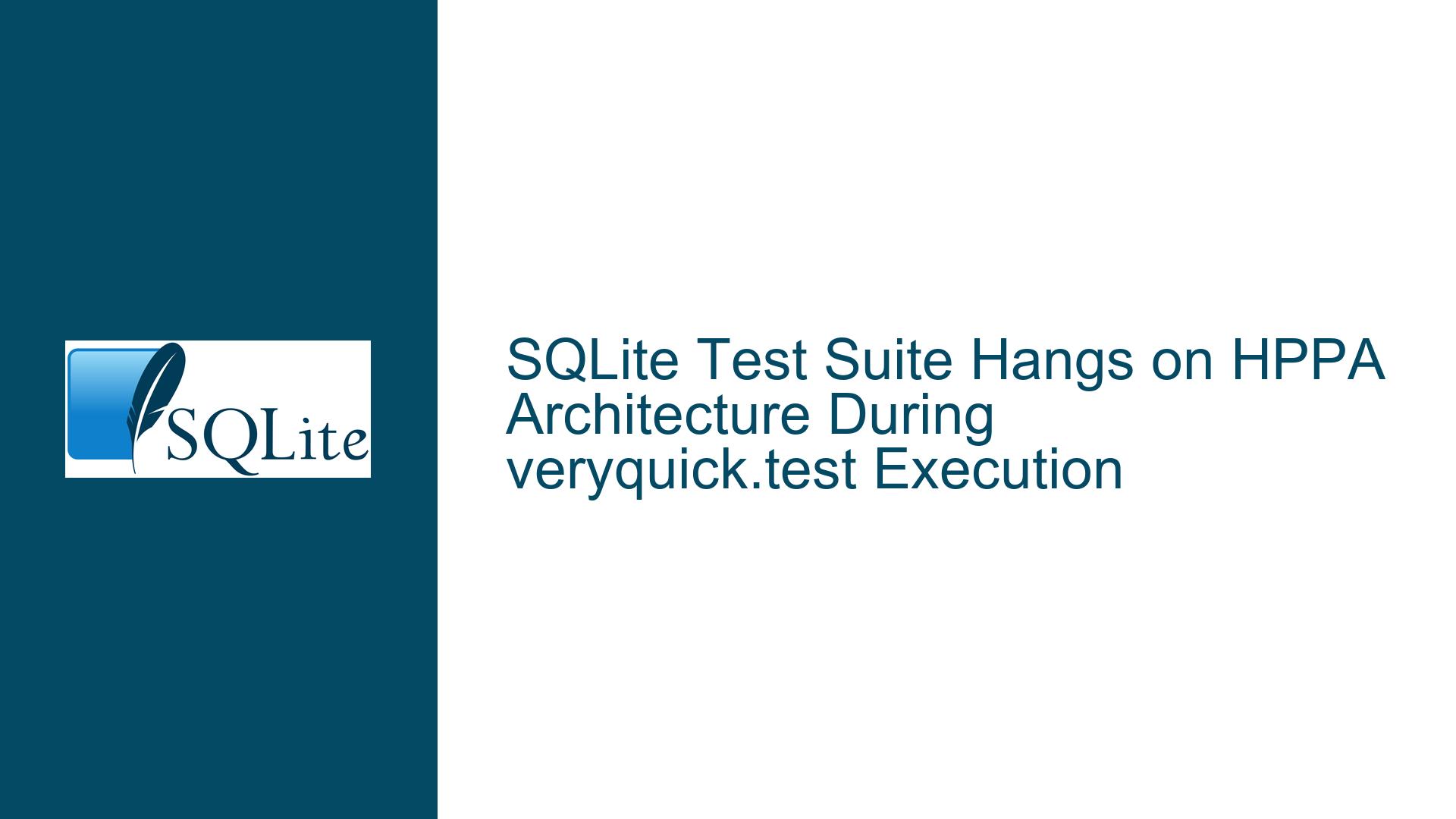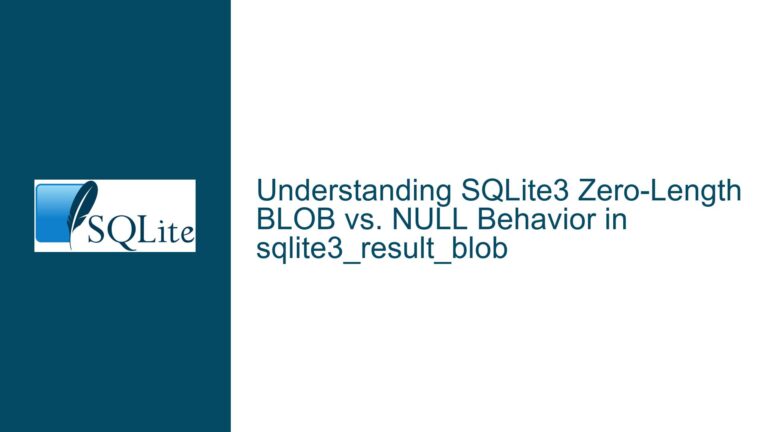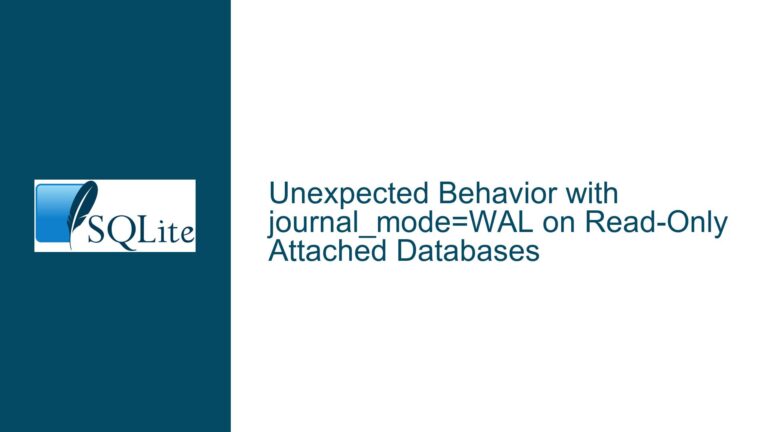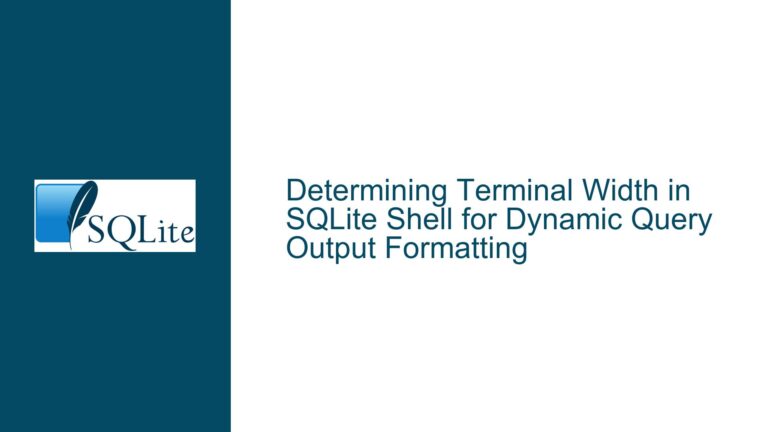SQLite Test Suite Hangs on HPPA Architecture During veryquick.test Execution
Issue Overview: SQLite Test Suite Hangs Indefinitely on HPPA Architecture
The core issue revolves around the SQLite test suite hanging indefinitely when executing the veryquick.test script on the HPPA (Hewlett-Packard Precision Architecture) platform. This issue manifests specifically after the e_blobclose.test completes successfully. The hang occurs during the execution of veryquick.test, which is a comprehensive test script designed to validate the functionality of SQLite under various conditions. The problem is particularly perplexing because running individual tests, such as e_blobopen.test, in isolation does not reproduce the hang. This suggests that the issue is not with the individual test cases themselves but rather with the interaction between multiple tests or the environment in which they are executed.
The hang is observed in the context of Gentoo Linux, a source-based distribution that compiles software from source code. The test suite is being run as part of the build process for SQLite versions 3.38.3 and 3.38.5. The hang is not a transient issue; it occurs consistently under the same conditions, making it a significant blocker for users attempting to build and validate SQLite on HPPA systems.
When the hang occurs, the process becomes unresponsive, and no further progress is made in the test suite. The log output shows that the last successfully completed test is e_blobclose.test, after which the system becomes unresponsive. Attaching a debugger (gdb) to the hung process reveals that the hang occurs within the pthread_mutex_lock function, which is part of the GNU C Library (glibc). The backtrace indicates that the hang is related to a mutex operation within SQLite’s sqlite3_blob_open function, which is used to open a BLOB (Binary Large Object) for incremental I/O.
The issue was bisected to a specific commit in the SQLite source repository, identified as 7fa20ca4c09ab024. However, the exact nature of the problem remains unclear, as the commit does not directly explain why the hang occurs. Furthermore, the issue appears to be resolved in SQLite version 3.39.0 and later, but there is concern that the underlying problem may have been masked rather than truly fixed.
Possible Causes: Mutex Deadlock or Resource Contention in SQLite’s BLOB Handling
The hang observed during the execution of veryquick.test on HPPA architecture is likely caused by a mutex deadlock or resource contention within SQLite’s BLOB handling mechanism. The backtrace from the debugger points to pthread_mutex_lock as the point of failure, suggesting that the process is waiting indefinitely for a mutex to be released. This mutex is part of SQLite’s threading and synchronization infrastructure, which is used to ensure that multiple threads or processes do not simultaneously access shared resources in a way that could lead to data corruption or inconsistent states.
One possible cause of the hang is a deadlock scenario where two or more threads or processes are waiting for each other to release locks, resulting in a situation where none of them can proceed. In the context of SQLite’s BLOB handling, this could occur if one thread acquires a lock on a BLOB resource and then attempts to acquire another lock that is already held by a different thread, which in turn is waiting for the first thread’s lock. This circular dependency can lead to a deadlock, causing the process to hang indefinitely.
Another potential cause is resource contention, where multiple threads or processes are competing for access to a limited set of resources, such as memory or file handles. In the case of SQLite’s BLOB handling, this could occur if the system is under heavy load or if the BLOB resources are being accessed in a highly concurrent manner. The HPPA architecture, with its unique memory model and threading implementation, may be more susceptible to such contention issues, leading to the observed hang.
The fact that the issue does not occur when running individual tests, such as e_blobopen.test, in isolation suggests that the problem is related to the interaction between multiple tests or the cumulative effect of running a large number of tests in sequence. The veryquick.test script is designed to run a comprehensive set of tests, which may include scenarios that stress the BLOB handling mechanism in ways that individual tests do not. This could expose latent issues in the threading or synchronization code that are not apparent under normal conditions.
The bisection of the issue to commit 7fa20ca4c09ab024 provides a clue, but the exact nature of the problem remains unclear. This commit may have introduced a change that inadvertently created the conditions for a deadlock or resource contention, or it may have exposed an existing issue that was previously hidden. The resolution of the issue in SQLite version 3.39.0 and later suggests that subsequent changes may have addressed the problem, but there is a concern that the underlying issue may have been masked rather than truly fixed.
Troubleshooting Steps, Solutions & Fixes: Diagnosing and Resolving the HPPA Hang
To diagnose and resolve the hang observed during the execution of veryquick.test on HPPA architecture, a systematic approach is required. The following steps outline a comprehensive strategy for identifying the root cause of the issue and implementing a solution.
Step 1: Reproduce the Issue in a Controlled Environment
The first step is to reproduce the issue in a controlled environment where the conditions can be carefully monitored and manipulated. This involves setting up a Gentoo Linux system on HPPA architecture and building SQLite versions 3.38.3 and 3.38.5 from source. The test suite should be run with the veryquick.test script, and the system should be monitored for the hang. If the hang is reproducible, the next step is to gather detailed diagnostic information.
Step 2: Gather Diagnostic Information
When the hang occurs, it is essential to gather as much diagnostic information as possible. This includes capturing the output of the test suite, examining the system logs, and attaching a debugger to the hung process. The backtrace obtained from the debugger provides valuable insight into the state of the process at the time of the hang. In this case, the backtrace indicates that the hang occurs within the pthread_mutex_lock function, which is part of the GNU C Library (glibc). This suggests that the issue is related to threading and synchronization.
Step 3: Analyze the Backtrace and Identify Potential Deadlocks
The backtrace shows that the hang occurs within SQLite’s sqlite3_blob_open function, which is used to open a BLOB for incremental I/O. The function calls pthread_mutex_lock, which suggests that the process is waiting for a mutex to be released. This could indicate a deadlock scenario where two or more threads are waiting for each other to release locks, resulting in a situation where none of them can proceed.
To identify potential deadlocks, it is necessary to examine the code paths that lead to the acquisition of the mutex in question. This involves analyzing the SQLite source code, particularly the sqlite3_blob_open function and the associated threading and synchronization code. The goal is to identify any circular dependencies or conditions that could lead to a deadlock.
Step 4: Review the Commit History and Identify Relevant Changes
The issue was bisected to commit 7fa20ca4c09ab024, which provides a starting point for identifying the root cause. This commit should be carefully reviewed to understand the changes that were made and how they could have introduced the conditions for a deadlock or resource contention. It is also important to review subsequent commits to determine if any changes were made that could have addressed the issue.
Step 5: Test with SQLite Version 3.39.0 and Later
The issue appears to be resolved in SQLite version 3.39.0 and later, which suggests that subsequent changes may have addressed the problem. It is important to test with these versions to confirm that the issue is no longer present. However, there is a concern that the underlying problem may have been masked rather than truly fixed. Therefore, it is essential to carefully review the changes made in these versions to ensure that the issue has been properly addressed.
Step 6: Implement and Test a Fix
If the root cause of the issue is identified, the next step is to implement a fix. This could involve modifying the threading and synchronization code to eliminate potential deadlocks or resource contention. The fix should be thoroughly tested to ensure that it resolves the issue without introducing new problems. This includes running the veryquick.test script on HPPA architecture and monitoring the system for any signs of a hang.
Step 7: Monitor for Recurrence
Even after a fix has been implemented and tested, it is important to monitor the system for any signs of recurrence. This includes running the test suite regularly and examining the system logs for any unusual activity. If the issue reoccurs, it may be necessary to revisit the diagnosis and implement additional fixes.
Conclusion
The hang observed during the execution of veryquick.test on HPPA architecture is a complex issue that requires a systematic approach to diagnose and resolve. By reproducing the issue in a controlled environment, gathering detailed diagnostic information, analyzing the backtrace, reviewing the commit history, testing with newer versions of SQLite, implementing and testing a fix, and monitoring for recurrence, it is possible to identify and address the root cause of the problem. While the issue appears to be resolved in SQLite version 3.39.0 and later, it is important to remain vigilant and ensure that the underlying problem has been truly fixed.






